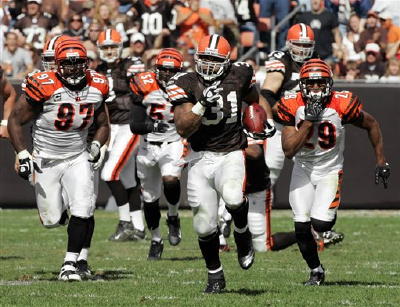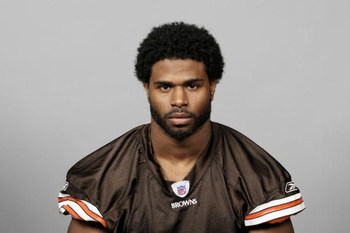 Browns Archive
Browns Archive  The Best Browns Running Backs of the Expansion Era
The Best Browns Running Backs of the Expansion Era
With the news that yet another battle-hardened Browns veteran has fallen victim to the ravages of time , the opportunity has come once again to consult the Book of Legacies: NFL Oracle Edition and figure out what we've now lost. After all, in our society of instant rankings, a player's worth in an NFL afterlife is directly determined by the on-field legacy left behind.
As for Jamal Lewis...
2007. There you go.
If this was it, then 2007 was a very good year indeed. While it's hard to remember a rejuvenated Lewis breaking off monster runs and dominating the fourth quarters of games just two seasons ago - at least based on the painful images of the past season and a half - his tenure as a Brown was nothing but remarkable, however brief it was.
Yet, what could be even more fascinating regarding Lewis - at least to long-suffering members of Browns Nation, is trying to determine his place in team history...or at least the concept we commonly refer to as the "expansion era."
In fact, despite Lewis' struggles since his record-breaking 2007 campaign, which includes the ugliest 1,000 yard rushing season in the history of the league and an injury-shortened 2009, he may just be the greatest Browns running back of the new era.
Once again - remember 2007?
We could just call it a day here and concede the title to Lewis, but then again it just wouldn't feel right.

First, Lewis' struggles in 2008 and 2009 far outweigh his successes of 2007, at least in terms of fan frustration regarding the offense. Although certainly not his fault, Lewis almost became the perfect symbol of a stagnant 2008 offense and the historically inept, pre-November version seen last year. Or, more correctly, just compare his powerful bursts through the hole in 2007 to his hundreds of stutter steps near the end.
Second - and here is where I branch off on my own - Lewis was never really a Brown, at least not emotionally. While he certainly was a team leader, thanks to his tough play and great experience, and while his 2007 contributions helped bring the team to the brink of the playoffs, Lewis was and always will be a Raven....the kind that repeatedly destroyed the Browns for much of the past decade.
In fact, seeing Lewis' name on the recently released NFL All-Decade Team further affirms his status as a Cleveland outsider. For everyone outside of the city, Lewis will always be remembered for the brilliant start to his career, which included record-setting rushing performances and a Super Bowl title. Lewis' Cleveland career will likely become nothing more than a footnote in his career narrative.
However, a footnote to him becomes a thousand-page novel to us.
Consider the following: Since the expansion era began in 1999 (although would some would dispute the fact that we've even begun...), who has been the best Browns running back?
Is it Lewis? If not, who else? Is such a discussion even possible?
Speaking of things impossible, I think it is utterly futile to come up with a ranked list of Browns' expansion era running backs. Just imagine the pointlessness of deciding whether Karim Abdul-Jabbar or Terry Kirby would go #8...
Here's a better solution...and one of those sobering wake-up calls that makes you remember who your team is.

Best Running Backs of the Expansion Era
Instead of debating the merits of each individual running back, let's just lump them together into neat little categories. Trust me - it's less painful.
The Legends
Jamal Lewis
William Green
Reuben Droughns
If we're evaluating players based on the overall landscape of their careers, then it's obvious that one player tends to stand out...just a touch. However, in terms of Cleveland contributions, not much separates these three players.
Basically, all three backs each enjoyed one solid year of production in Cleveland, followed by either injury, off the field drama, contract issues or any combination of the three. Or, in William Green's case, in a most unfortunate series of events, "he fell on a knife." Which has happened exactly zero times in the history of the real world.
When evaluating the legends, it's worth noting that each back contributed in a very meaningful and specific manner.
In Droughns' case, he delivered the team's first 1,000 yard rushing effort in some twenty years - in fact the last player(s) to accomplish such a feat in Cleveland were Kevin Mack and Earnest Byner. While on the surface Droughns' 2005 season doesn't appear the least bit sensational, his performance was an event that Browns Nation had forgot even existed.
As for Green, the starcrossed back from Boston College didn't last long in the league, thanks to a variety of off-field issues and some injuries. In a sense, Green's upbringing and arrested development thanks to a fast-track rise into the NFL basically destined him for ultimate failure. However, before such a fate manifested itself, Green was the offensive spark that carried the Browns into the 2002 playoffs.
And of course, volumes have been written about Lewis and his majestic 2007 season. While the Browns just missed out on the playoffs, Lewis' arrival in Cleveland signaled both a rebirth of a player, as well as an NFL franchise - at least for the briefest of windows. And really, in the end - perhaps this was Lewis' greatest contribution to the Browns - that of a player who helped restore credibility to the franchise...at least for a few minutes.

The Flashes
Jerome Harrison
Lee Suggs
So, here's the question - how close was I to putting Jerome Harrison into "The Legends" category?
How many games did the Browns win in December?
Seriously, it's not like the bar is set all that high. If Harrison contributes a 1,000 yard season in 2010 and the Browns make a playoff run, he instantly becomes the best back of the new era.
However, if you have followed Harrison's history as an NFL back, you'll know that nothing defines him more than inconsistency.
Granted, Harrison has been ignored by two head coaches during his Browns tenure and regularly has struggled with various injury problems. In all fairness to Harrison, we have no idea what type of true potential he actually has. For all we know, we could be looking at the next Leroy Kelly, or possibly the next Lee Suggs.
Speaking of which - over the past decade, has there been a bigger tease than Suggs?
Possessing some phenomenal running back skills, Suggs exited the league much as he entered it...as an injury waiting to happen. In between some sensational breakaways - far between, mind you - Suggs' career was as tenuous as the frail bones and tissue that comprised his delicate frame.
However, since Suggs was a running back - in Cleveland - there was always hope. More on this later...
The Replaceables
James Jackson
Jamel White
Terry Kirby
Karim Abdul-Jabbar
I guess another way to label this group would be "The Running Backs Who Only Played Because of the Utter Lack of Roster Depth." Just rolls right off the tongue.
Anyway, what is there to say about these four, other than they all featured marginal talent and played behind what was perennially the worst offensive line in the league?
What else is there to say? James Jackson was one angry dude.

Ghosts of Running Back Potential Past
Ben Gay
Madre Hill
James Davis
Josh Cribbs
And now for my favorite category.
Call it the Curse of Jim Brown, or even cite the negative karma associated with the 1985 squad featuring two 1,000 yard rushers, but in Cleveland, nothing excites the fan base more than a running back who flashes some potential.
Then again, call it a simple longing.
Because we have not had a consistent and successful running game since forever, not to mention an actual back who could be considered even remotely close to dynamic, the slightest hint of anything sends our senses reeling.
Consider the Legend of Ben Gay. For the briefest of moments in 2001, we essentially had discovered Eric Dickerson reincarnated. Of course, reality intervened - along with the nagging discovery that Gay possessed virtually no organized football experience. Much like Madre Hill before him, Gay's career in Cleveland was over before it even began.
As for what's next, let's hope that James Davis' greatest Browns contribution does not remain an 80-yard score against Detroit's third-team defense last preseason. Or that we've blindly allowed our team to miscast Josh Cribbs for the past five seasons.
After all, it's not much of a list.
- NBA Announces 2013-2014 Schedule
- Browns Ink Sharknado
- Sharknado A No-Show For Rookie Camp
- Trent Richardson Out Until Training Camp
- Browns Sign Brandon Jackson
- Carrasco Suspended Eight Games
- Browns Add to Wide Receiver Depth with David Nelson
- Browns Need to Learn from Past Draft Mistakes
- Browns Release Chris Gocong and Usama Young
- Browns Missing on Grimes Disappointing, But Not The End
The TCF Forums
- Jackets 2014
bac5665 (Tuesday, January 21 2014 11:55 PM) - Who is the worst owner in Cleveland Sports
mattvan1 (Tuesday, January 21 2014 10:05 PM) - 2015 Recruiting
furls (Tuesday, January 21 2014 7:43 PM) - Devone Bess
Spin (Tuesday, January 21 2014 5:35 PM) - 2014 Recruiting
jclvd_23 (Tuesday, January 21 2014 4:38 PM) - Official- Browns Coach Search/Rumors
googleeph2 (Tuesday, January 21 2014 3:42 PM) - Movies coming out
rebelwithoutaclue (Tuesday, January 21 2014 12:56 PM) - The 2014 Offseason Thread
Larvell Blanks (Tuesday, January 21 2014 12:25 PM) - Chris Grant's first 3 drafts
Kingpin74 (Tuesday, January 21 2014 10:13 AM) - Mike Brown
YahooFanChicago (Monday, January 20 2014 11:15 PM)



